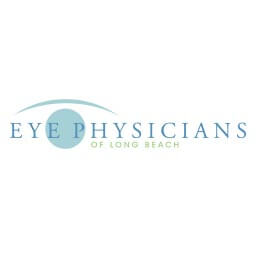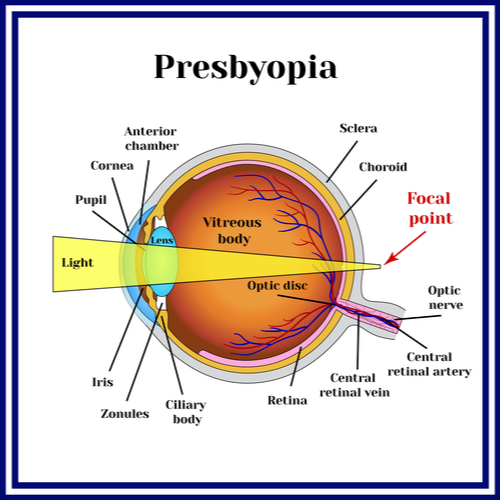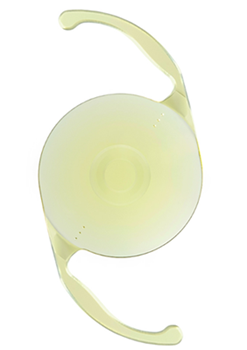Blog post by: Eye Physicians of Long Beach

As we age, our bodies begin to change, and this is no exception to our vision. Individuals over the age of 40 commonly experience presbyopia, an eye condition that affects near vision acuity.
There are many options available to treat presbyopia, and many patients use reading glasses to make up for the loss of clear up-close vision. For those who don’t want the hassle of wearing glasses, there are plenty of other options, including contact lenses and surgical vision correction.
AcrySof IQ Vivity IOL from Alcon is now an available option, providing clear visual acuity at a range of distances. The AcrySof IQ Vivity IOL is a lens implant that corrects visual acuity and restores vision at multiple distances, without needing to wear glasses or contact lenses.
Keep reading to learn more about this exciting new vision correction option!
What is presbyopia?

Presbyopia is an eye condition that occurs as a result of the aging process. When you are young, the lens in your eye is soft and pliable, and able to easily change its shape in order to focus. Over time, the lens in your eye becomes less flexible, making it harder to focus on objects that are both up-close and far away.
As you age, the lens becomes more rigid and cannot change shape as easily. This usually starts to occur after or around the age of 40. As a result of this, you may find tasks like reading or threading a needle to sew become harder. You may start to notice that you need to hold your books or other reading materials farther away from your face to see them clearly.
Can you treat presbyopia without surgery?
Yes, there are many ways that you can combat vision loss caused by presbyopia, depending on what you are comfortable with. Some patients prefer to wear reading glasses or contact lenses to correct vision.
Prescription eyeglasses

While many use reading glasses to correct vision loss caused by presbyopia, others may wear prescription eyeglasses like bifocals, trifocals, or progressive lenses. The difference between reading glasses and eyeglasses is that eyeglasses are used to treat vision problems other than presbyopia. This includes refractive errors like nearsightedness, farsightedness, and astigmatism. With reading glasses, you don’t usually need a prescription for them and may even be able to buy them over the counter.
Contact lenses
If you have presbyopia but don’t want to wear glasses, there are two kinds of contact lenses used to treat presbyopia: Monovision contacts and multifocal contacts. Monovision contacts work by correcting one eye for distance vision and the other eye for up-close vision. It can be difficult for some patients to get used to this new way of seeing. You may find it harder to judge the speed or distance away from you that something is while you get used to monovision contacts.
The second kind of contact lenses you can wear for presbyopia are multifocal contacts. With these contacts, there are several rings (known as zones) set to different powers. This design allows you to use both near and far vision at the same time. It may take you a little time to figure it out, but your brain will eventually learn how to automatically choose the right focus.
What if I don’t want to wear glasses or contacts?
Good news: there are plenty of options if you don’t want to deal with reading glasses, prescription glasses, or contacts with presbyopia! LASIK for Monovision and the KAMRA Inlay are great options. One of the most popular ways to treat presbyopia is during refractive lens exchange or cataract surgery.
These procedures are very similar to one another, and each involve the removal of the natural lens of the eye. Once removed, the natural lens is replaced with an intraocular lens, commonly called an IOL. IOLs are designed to correct refractive errors and provide clear vision, and there are benefits to different types of IOLs available.
The primary difference between the two procedures is that cataract surgery is performed when the natural lens of the eye has become clouded with a cataract. Patients may need cataract surgery in addition to having presbyopia. Removing the entire lens and replacing it with an artificial lens solves the problem of distorted vision.
Now, if you have presbyopia, or presbyopia and cataracts, you can get an IOL that corrects your near vision.
What are my IOL options if I have presbyopia and cataracts?
Traditionally, the three main types of IOL that correct for presbyopia are multifocal IOLs, extended depth of focus IOLs, and accommodating IOLs. Now, there is a new IOL called the AcrySof IQ Vivity, offered by Alcon.

The Vivity lens was FDA approved in February of 2020. We are one of the first practices to offer Vivity and implant it. The Vivity lens is different because it’s the first IOL of its kind with X-Wave technology. X-Wave technology uses a non-diffractive design, which reduces cataract and presbyopia patient’s dependency on glasses. Because of its design, patients experience high-quality vision at far and intermediate distances. Patients also experience functional near vision.
More importantly, though, the Vivity’s proprietary technology addresses some of the more common visual disturbances that other lenses have. This is thanks to non-diffractive technology, which uses two smooth surface transition elements. These elements work together simultaneously to create a continuous and extended range of vision.
In other words, the Vivity lens does not have separate focal points, which is important if you want to avoid visual disturbances. This includes being able to see in all lighting (bright and dim), as well as low levels of starburst, glare, and halos. Vivity was launched with select ophthalmologists, including Eye Physicians of Long Beach and we have already implanted Vivity with great success.
Who is a good candidate for the Vivity lens?
The Vivity lens is an excellent vision correction option for patients with cataracts or presbyopia, although it may not be right for every patient. The only way to know for sure if the Vivity lens is right for you is to schedule a cataract screening with one of the ophthalmologists at Eye Physicians of Long Beach.
Want to learn more about the Vivity lens and when it will be available at Eye Physicians of Long Beach for patients with presbyopia? Schedule an appointment with us in Long Beach, CA today!
